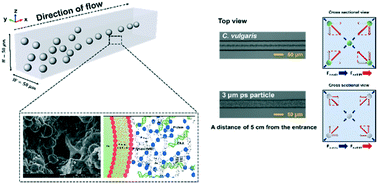Our official English website, www.x-mol.net, welcomes your
feedback! (Note: you will need to create a separate account there.)
Focusing manipulation of microalgae in a microfluidic device using self-produced macromolecules†
Lab on a Chip ( IF 6.1 ) Pub Date : 2018-02-26 00:00:00 , DOI: 10.1039/c7lc01324h Min Jung Kim 1, 2, 3, 4, 5 , Jae Ryoun Youn 1, 2, 3, 4, 5 , Young Seok Song 5, 6, 7, 8
Lab on a Chip ( IF 6.1 ) Pub Date : 2018-02-26 00:00:00 , DOI: 10.1039/c7lc01324h Min Jung Kim 1, 2, 3, 4, 5 , Jae Ryoun Youn 1, 2, 3, 4, 5 , Young Seok Song 5, 6, 7, 8
Affiliation

|
Extracellular polymeric substances (EPSs) are self-produced biosynthetic macromolecules that have a three-dimensional architecture in bacterial biofilms and are mainly composed of a mixture of polysaccharides, proteins and nucleic acids. Compared with synthetic polymers, EPSs can have a long relaxation time due to their structural complexity. We exploited the non-Newtonian rheological behavior of EPSs extracted from Chlorella vulgaris with the help of cell focusing and particle focusing in confined microchannels. The microalgae showed a ‘self-ordering’ behavior in the ‘self-secreted’ substances. The EPSs were characterized and analyzed chemically and rheologically. In a microfluidic device, they enable outstanding particle focusing over a wide range of flow rates. This study can open an effective, unique pathway for applications of biomass related resources such as EPSs.
中文翻译:

使用自行生产的大分子在微流控设备中进行微藻的聚焦操作†
细胞外聚合物(EPS)是自生的生物合成大分子,在细菌生物膜中具有三维结构,主要由多糖,蛋白质和核酸的混合物组成。与合成聚合物相比,EPS由于其结构复杂性而具有较长的弛豫时间。我们利用了从小球藻提取的EPS的非牛顿流变行为在有限的微通道中进行细胞聚焦和颗粒聚焦。微藻在“自分泌”物质中显示出“自排序”行为。对EPS进行化学和流变学表征和分析。在微流控设备中,它们可以在很大的流速范围内实现出色的颗粒聚焦。这项研究可以为生物质相关资源(如EPS)的应用开辟一条有效的,独特的途径。
更新日期:2018-02-26
中文翻译:

使用自行生产的大分子在微流控设备中进行微藻的聚焦操作†
细胞外聚合物(EPS)是自生的生物合成大分子,在细菌生物膜中具有三维结构,主要由多糖,蛋白质和核酸的混合物组成。与合成聚合物相比,EPS由于其结构复杂性而具有较长的弛豫时间。我们利用了从小球藻提取的EPS的非牛顿流变行为在有限的微通道中进行细胞聚焦和颗粒聚焦。微藻在“自分泌”物质中显示出“自排序”行为。对EPS进行化学和流变学表征和分析。在微流控设备中,它们可以在很大的流速范围内实现出色的颗粒聚焦。这项研究可以为生物质相关资源(如EPS)的应用开辟一条有效的,独特的途径。











































 京公网安备 11010802027423号
京公网安备 11010802027423号